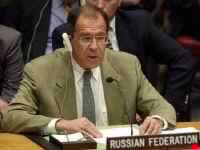[Sergey Lavrov, Russia's Ambassador to the United Nations. Read photo caption below].
UNITED NATIONS, (Islamweb & Agencies) - Russia told the Security Council on Tuesday it could not accept a US-backed plan to revamp the UN's Iraqi sanctions regime, and submitted a counter-proposal with a timetable for suspending sanctions.
The move cast new doubt on the possibility of reaching agreement by the council's July 3 deadline on proposals to end the civilian trade embargo on Iraq while tightening controls on oil and arms smuggling.
Sergei Lavrov, Russia's ambassador to the UN, circulated a draft resolution shortly before the start of a public debate in the council on Iraq.
All 15 council members were scheduled to speak in the debate, along with 23 non-members. They included Iraq and Kuwait, invaded by Iraq in August 1990. The invasion led to the most wide-ranging and longest lasting sanctions the council has yet imposed.
Addressing the council, the acting US ambassador to the UN, James Cunningham, claimed that the government of Iraqi President Saddam Hussein "remains unrepentant to this day".
The sanctions, he went on to say, must stay in place until Iraq had eliminated its weapons of mass destruction and was no longer a threat to regional security. "But it is clear that the Iraqi people have borne the burden of the regime's policies," Cunningham said.
The United States therefore supported a British draft resolution to scrap the 11-year-old civilian trade embargo and implement new measures to prevent Iraq from importing goods with a military potential, he said.
He made it clear, however, that other sanctions would not be suspended until Iraq complied with Resolution 1284, adopted by the council on December 17, 1998, which demands it allow the UN arms inspectors back into the country and cooperates fully with them.
Lavrov, the first speaker in the debate, outlined what he said were major flaws in the British proposals.
They sought to extend the list of prohibited military goods, he said, and contained nothing about investment or infrastructure projects.
Russia had agreed to a one-month timetable for discussion of the British text, but "the deeper we get into the details the more our doubts grow about the feasibility of that draft," he said.
If adopted, the British draft would strengthen and perpetuate the sanctions regime, exacerbating tensions in the Middle East which were already at danger level, he said.
"We cannot agree to this draft resolution, which can simply not go through," Lavrov said.
Russia was still prepared to discuss ways of improving the humanitarian situation in Iraq, "but such a discussion must not be politicised," he said.
Meanwhile, he said, there must be no further delay in resuming work on a comprehensive settlement, to remove the "gaps and ambiguities" which made Resolution 1284 unworkable.
The draft resolution circulated by Lavrov would indefinitely suspend the trade embargo on civilian trade once the UN arms inspection team was fully deployed in Iraq.
If adopted, it would also transfer funds from the UN's escrow account to the government of Iraq, something that is unacceptable to Britain and the United States.
Speaking to reporters before the debate, the British ambassador to the UN, Jeremy Greenstock, said the Russian draft was "quite a disturbing text" that sought to rewrite 1284.
"It starts a circle that can't be broken out of," Greenstock said. "It is not a positive approach."
Cunningham said the only thing he could agree with in the Russian draft was "the assertion towards the end of the text that Iraq constitutes a threat to international peace and security."
- Author:
Islamweb & Agencies - Section:
WORLD HEADLINES


 Home
Home Discover Islam
Discover Islam Quran Recitations
Quran Recitations Lectures
Lectures
 Fatwa
Fatwa Articles
Articles Fiqh
Fiqh E-Books
E-Books Boys & Girls
Boys & Girls  Women
Women










